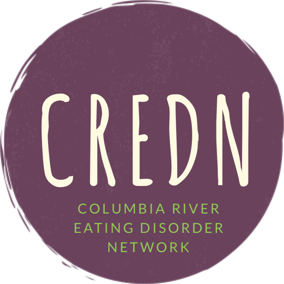About Eating Disorders
If you are here because you, or someone you care for, may be struggling with an eating disorder, you are in the right place. CREDN is dedicated to helping people find the support they need in the PNW.
Eating Disorder Snapshot...
- Eating disorders have the highest mortality rate of ALL mental health diagnoses
- There are psychobiosocial components to developing an eating disorder
- Binge eating disorder is the most prevalent eating disorder diagnosis
- Eating disorders don’t discriminate - anyone can have an eating disorder
- Disordered eating issues cannot be determined by body size
- Eating disorders are more prevalent in the TGNC (Transgender, Non-conforming) community
- Minority groups attain eating disorder treatment least due to lack of accessibility of care
- Dieting creates the MOST vulnerability to developing an eating disorder

Recovery 101
- It takes an average of 7 years to recover from an eating disorder
- Levels of care for eating disorder recovery include: outpatient, intensive outpatient, partial hospitalization, residential, and hospital level of care
- Ideally, a treatment team is comprised of eating disorder-informed professionals who are working within their scope of practice
- Caregivers and loved ones are integral parts of the recovery process
- Informed-care is essential in recovery based on the complexity, co-occurring issues, and needs related to this disease
- Professionals who are not trained to treat eating disorders often unknowingly contribute to/collude with disordered behaviors
- Eating disorder presentation/diagnosis often shifts within the span of recovery
Intuitive Eating is an important aspect of many people's recovery that helps promote sustainable, long-term healing with food and body - Health At Every Size is a framework for understanding that health is not determined by size or shape - recovery needs to include an understanding of the negative health impacts of fat phobia and weight stigma while focusing on healing problematic behaviors
